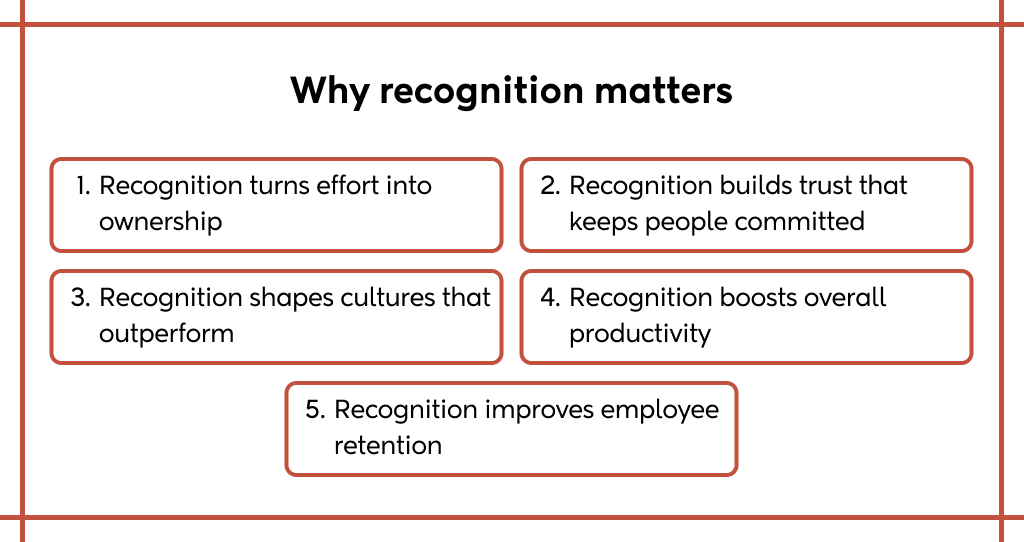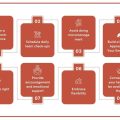With the workplace evolving faster than ever, compensation has not remained the only “X factor” that motivates employees. It is thoughtful recognition, genuine appreciation, and consistent acknowledgment that inspire employees to give their best.
Because at its core, recognition is human. A simple yet powerful practice that fulfills three deep human needs: belonging, significance, and contribution. It connects effort with meaning, and performance with purpose.
Yet, many leaders still confuse recognition with rewards — but the two are fundamentally different.
- Rewards are transactional. They come in the form of bonuses, promotions, or perks.
- Recognition is emotional. It’s expressed through gratitude, appreciation, and acknowledgment.
And the second works far better than merely offering financial incentives or monetary rewards.
Because when employees feel seen, valued, and appreciated, they show up with intention, energy, and commitment. They care not only about their work but also about the organization they serve. And that consistent engagement, born from recognition, is what truly drives sustainable business success.
Why recognition matters more than ever

Recognition is an effective solution to enhance organizational performance.
Research shows that employees who receive high-quality recognition are 45% less likely to leave the organization, thereby minimizing voluntary turnover.
Because without recognition, even well-compensated employees can quietly disengage and actively seek new job opportunities. And the impact doesn’t stop with one resignation.
When a top performer or key leader leaves, the impact extends to the entire team’s dynamics, morale, and productivity.
This highlights the growing importance of recognition in a workforce where employees increasingly seek appreciation, connection, and purpose more than perks or pay hikes.
Here’s the secret link between recognition and performance:
- Recognition turns effort into ownership
When employees feel valued and appreciated for their efforts, not just for their wins, they naturally feel more motivated to push further. They do not just get work done but take initiative, go beyond expectations, and take full accountability for outcomes. That validation turns passive contribution into proactive engagement, which drives innovation, agility, and performance across teams.
- Recognition builds trust that keeps people committed
When timely and genuine appreciation is shared, employees feel a deeper sense of belonging and connection to their team and leaders. They trust that their work is seen and fairly acknowledged. They consider themselves integral to the organization’s success, reducing their urge to look elsewhere. And that’s the kind of loyalty no money or promotion can buy.
- Recognition shapes cultures that outperform
A culture that values appreciation and gratitude never fails to build a culture of shared growth. Whether it’s top-down, peer-to-peer, or cross-functional, every acknowledgment strengthens collaboration and morale. Everyone lifts each other up, shares credits, celebrates wins, and grows together. Over time, this culture succeeds in attracting top talent and retaining those who truly care.
- Recognition boosts overall productivity
Well-recognized employees do not just complete tasks faster, but also show up with great energy, creativity, and problem-solving skills. They approach every challenge with laser-sharp focus and motivation to excel beyond what their formal role demands. It builds an environment where every individual’s excellence compounds into the shared success of the team.
- Recognition improves employee retention
When employees are acknowledged for the impact they create, they find a personal stake in the organization’s success. They deeply invest not by merely showing up or serving a longer tenure, but by deeply investing their hearts and minds in work. This sense of fulfillment and purpose provided by consistent recognition gives them little reason to look for other opportunities.
What meaningful recognition looks like
Recognition doesn’t always have to be grand or reserved for formal settings. Sometimes, genuine words of appreciation in the little, informal moments can also make the biggest difference in employees’ motivation and morale.
Companies can use both formal and informal methods, or a thoughtful mix of both, to ensure their employees always feel valued and appreciated.
Formal methods
Formal recognition programs are structured and strategic. They require proper setup, planning, and follow-through to ensure consistency and fairness. But they only truly work if they feel personal and human.
Examples and ideas:
- Annual or quarterly awards programs: These programs celebrate major milestones or recognize employees’ initiatives that have made a major business impact. This inspires others to excel and contribute meaningfully toward shared goals.
- Employee of the Month initiatives: Regular appreciation keeps employees’ morale high and motivation steady. It helps employees feel valued consistently, not just during review cycles.
- Public acknowledgments in company-wide meetings: These instances allow recognizing employee efforts in real time and in front of peers. This boosts a sense of pride and confidence in them.
Informal methods
Informal recognition, though simple, comes in small, everyday moments and leaves a lasting impact. These feel more personal and authentic.
Examples and ideas:
- Verbal appreciation during daily stand-ups: A quick “great job,” “thanks for stepping up,” or “that was impressive” in front of peers gives instant recognition and boosts morale.
- Quick thank-you messages or shoutouts on chat tools: A small “thank you,” “well done,” or encouraging note in a team email, chat, or comment can make someone’s day in the simplest yet most meaningful ways.
- Celebrating small wins or milestones: Recognizing small achievements, consistent efforts, and learning moments, even if they didn’t lead to results, gives employees a reason to always move forward with confidence.
Conclusion
People don’t just work to get paid. Of course, it is a crucial parameter that sustains motivation and security. But a job that also sees them for their efforts, ideas, and impacts earns their loyalty and commitment.
Because employees who feel content and valued in their roles do not just perform better but also become advocates who speak positively about your organization and help keep others motivated and engaged.
Recognition isn’t a one-time event; it’s a consistent practice to include in your everyday culture. Just make sure your recognition is specific, authentic, and personalized – not generic. And remember, timing equally matters. Appreciation offered at the right moment carries more weight than delayed acknowledgment.




















No Comments